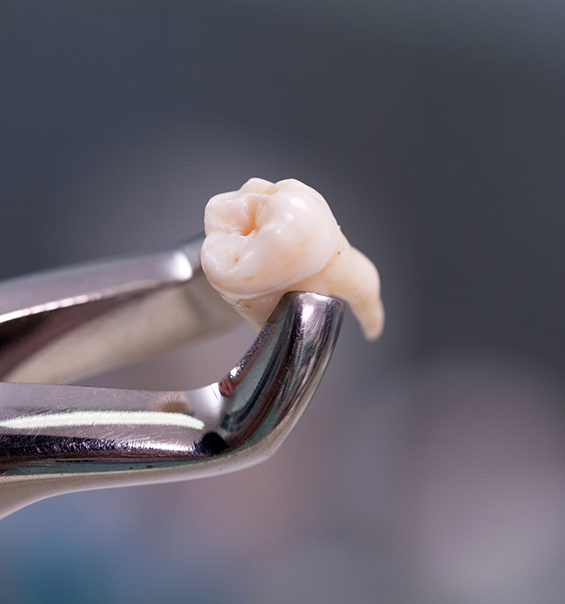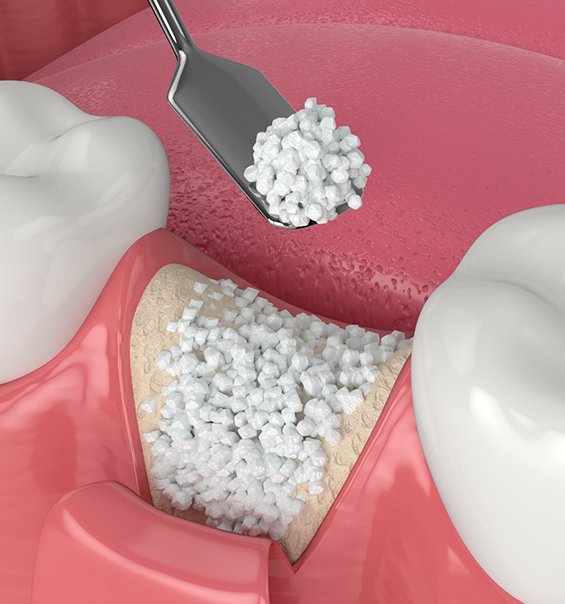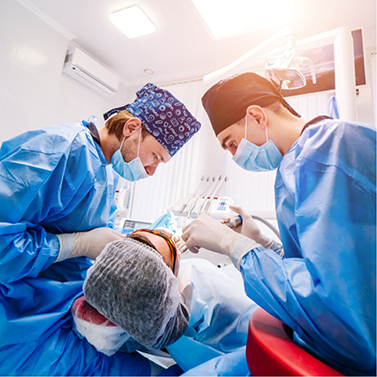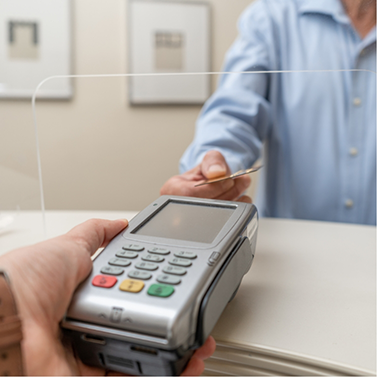Tooth Extractions & Oral Surgery West Palm Beach
When Smiles Need More Complex Care
At Palm Beach Dental Excellence, we don’t stop at providing general dentistry services. We go beyond to create an environment that allows for even the most complex cases to receive help. This is why we offer tooth extractions and oral surgery in our West Palm Beach dental office. Our team is here to not only put your mind at ease but also ensure your safety and comfort while removing a tooth or even performing a bone graft. Call us today to inquire about our available services and how we can help create a stronger, healthier smile.
Why Choose Palm Beach Dental Excellence for Tooth Extractions & Oral Surgery?
- Highly Experienced and Trained Dentist
- Top-Rated Dental Team in West Palm Beach
- Utilize Advanced Dental Technology
When Are Tooth Extractions Necessary?

While everything we do at our dental office is intended to help preserve your natural smile, sometimes, the best course of treatment may involve removing a tooth. This may be the case if:
- A tooth is too damaged to be restored
- Periodontal disease has damaged the bone supporting a tooth
- Room needs to be created for orthodontic treatment
- Room needs to be created for a denture
- A tooth is going to be replaced with a dental implant
In any case, we will handle your extraction with a light touch, and with the help of local anesthesia, we promise that you’ll barely feel anything at all.
The Process of Removing a Tooth

The process of removing a tooth depends largely on if it has broken through the gumline or if it’s trapped beneath the surface. If it’s the first, then our talented emergency dentist will use special instruments to gently rock the tooth loose. If it’s the second, then he will create a small incision in the gums to access the tooth before removing it. Fortunately, teeth can be removed with minimal postoperative discomfort. In fact, our patients often tell us, “That was incredible!” because they felt no pain. It’s not magic – just a lot of experience!
Tooth Extraction Aftercare

The healing period is crucial. After all, the last thing we want is for a dry socket or infection to develop! That’s why we provide our patients with detailed aftercare instructions, including:
- Sticking to soft foods, like soup
- Drinking plenty of water
- Keeping your mouth clean
- Taking OTC pain medication as directed
- Not exercising or lifting anything heavy
- Not using a straw, spitting, or smoking
Bone Grafting After a Tooth Extraction

Most of the time, when a single tooth or multiple teeth need to be removed, bone grafting will be discussed as a recommendation for preserving the bone. When you have a tooth extraction, there is a space (socket) that remains where the root once sat in the jaw. When a tooth is lost, this hole will shrink as it heals, and the bone around it can actually start to disappear. To prevent further loss of bone, a bone graft can be used to make sure this area retains its thickness and strength. This is important for many reasons:
- If we want to eventually replace the tooth, we need to have a solid bone in the area for support.
- It is much easier from a time and expense perspective to retain existing bone than to build bone back up once it is lost.
- To prevent the bone from collapsing and creating a defect next to neighboring teeth that could compromise the strength of those teeth.
- To prevent the bone from collapsing and creating a cosmetic defect and making the bone appear “sunk in.”
Making sure the jaw is strong is also important for replacing missing teeth. There are many ways we can do this, and they all require that the jawbone be healthy and even:
- A dental implant can replace a single or multiple lost teeth.
- A dental bridge is a series of prosthetic teeth that are anchored together at either side of the missing tooth. If one tooth is missing, it is essentially the three crowns that are connected, with the two teeth on either side of the gap connected to a false tooth in the middle. A bridge is permanently cemented onto your teeth so that it does not come out.
- A removable denture (also called a “partial denture”).
Understanding the Cost of Tooth Extractions

No one wants to have a tooth extracted. However, sometimes it is necessary to maintain the health of the rest of your smile. One concern that you might have about your upcoming tooth extraction is the cost. We won’t be able to determine how much your procedure will be until you see us in person. In the meantime, here are some things for you to consider:
Factors That Can Affect Tooth Extraction Cost

There are a few different factors that need to be considered when determining the cost of your tooth extraction. Here are the most prominent:
- Number of Teeth: The more teeth you need to have extracted, the higher the overall cost will be.
- Complexity: Depending on where your tooth is located in your mouth and whether it is impacted, the cost will vary. Some extractions are much easier to complete than others.
- Tooth Replacement: If you need to replace your missing tooth with a dental implant or another tooth replacement option, you should consider the cost of this as well.
Does Dental Insurance Cover Tooth Extractions?

Most of the time, dental insurance plans will partially cover the cost of an extracted tooth at 50% after your deductible has been met. However, there can be limits in place or a waiting period before the coverage kicks in. Every plan is unique, so it is best to confirm this with your dental insurance company first so that you don’t run into any surprises. Our team will also be happy to help you with this process.
How to Make Tooth Extractions Affordable

If you don’t have any dental insurance, this doesn’t necessarily mean that you will be left completely on your own. We accept payments through CareCredit – a third-party financing company that can split the cost of your treatment into manageable monthly installments with little to no interest. To learn more about your financial options, don’t hesitate to reach out to one of our friendly team members.
Tooth Extraction FAQs
Does It Hurt to Have a Tooth Extracted?
Most patients have reservations about any sort of dental work, but when it comes to tooth extractions, there are often concerns about potential pain and discomfort. Fortunately, whether you’re having one tooth extracted or multiple, the very last thing you’ll have to worry about is pain. Dr. Asinmaz and his team go above and beyond to ensure that the process is entirely pain-free for you! Your mouth will be numbed during the procedure, and though you might feel some slight pressure, you won’t feel any outright pain. Following your appointment, you might feel some residual soreness, but this is normal, and it can easily be managed with cold compresses, over-the-counter pain relievers, and other aftercare guidelines provided by us.
What Risks Are Involved with Tooth Extractions?
Fortunately, these days, tooth extractions are considered to be incredibly safe, and you shouldn't fret if we suggest them. That said, any sort of dental procedure comes with some inherent risks. Following tooth extractions, the primary concern is infection since it can spread throughout the rest of the body if it isn’t handled quickly. Another potential risk includes dry sockets, which can be painful as well as disruptive to the healing process. To prevent these risks, we’ll be sure to provide you with an extensive list of aftercare instructions, as well as a few common symptoms of infection to watch for.
Do Extracted Teeth Need to Be Replaced?
Simply put, it will always be in your best interest to replace missing teeth, whether they’ve been knocked out accidentally or extracted professionally. One exception to this is wisdom teeth; they come out for good! However, even just one small gap in your smile is enough to negatively impact your ability to bite, chew, and speak, as well as your self-esteem, which is why we’re excited to offer a wide range of tooth replacement solutions for patients with varying needs, including dental bridges, dentures, and dental implants, all of which are tried-and-true and guaranteed to leave you with a bright, complete smile. Therefore, it’s recommended that once you’re done healing and you’ve spoken with us about viable tooth replacement options, you should schedule an appointment to get the ball rolling!
How Should I Prepare for My Tooth Extraction?
You might feel a little unsure about how to prepare for your tooth extraction, but you can rest assured that we’ll walk you through every preparatory step. Before your procedure, let Dr. Asinmaz know if you have any questions or concerns, even if it’s about something as simple as what to bring with you or what to eat before and after your appointment. It’s also a wise idea to arrange for someone to take you home afterward since you won’t be able to drive due to the effects of the local anesthesia. This includes picking up any necessary prescriptions, food, or other necessities, so plan accordingly!
